Available projects for MSc in Physics and Engineering Medicine 2012-2013
1. Computational approaches to correcting geometric distortion in MR: application to the mapping of brain microstructure
Theme: Physics; Computing
Description: Geometric distortion is a common artifact plaguing images acquired using magnetic resonance imaging (MRI). Such artifact has to be removed from the affected images before they can be analyzed to assist clinical diagnosis of diseases. There are ongoing interests in identifying the technique that can produce the most artifact-free images. This project will compare a recently developed technique against the standard approach in the field. The assessment will be made in the context of brain microstructure mapping using MRI, which is playing a key role in image-assisted diagnosis, e.g., of dementia. The student will use FSL, a popular and well-documented software suite that implements both correction techniques, to process and analyze a set of existing MRI data for mapping brain microstructure. The aim of the project is to identify the correction technique that is most suitable for the mapping of microstructure.
Requirements: Basic math and computing skills
Skills to be acquired: In-depth understanding of MRI; MR data visualization and analysis with matlab and FSL
Student: Project Available
2. Robust diffusion tensor MR imaging for clinical trials of novel therapeutics
Theme: Physics; Computing
Description: Diffusion tensor MR imaging (DTI) is an advanced MRI technique with important applications in clinical trials of novel therapeutics for brain disorders, such as dementia. The technique provides unique probe of tissue microstructure non-invasively, making it an indispensable tool for detecting early pathological changes as well as for monitoring therapeutic effects. One key challenge facing DTI is its relatively long acquisition time, which makes it prone to data corruption due to intermittent subject motion. The inclusion of such data may compromise the accuracy of the resulting tissue microstructure estimates. However, its effect has not yet been examined in the context of therapeutic trials. This project will investigate this problem, in particular in the context of ongoing studies of neurodegenerative diseases at UCL. The student will use Camino, a well-documented software suite for analyzing DTI data, to study a variety of strategies to robustly process existing clinical data set. This study will identify the most robust strategy for use in clinical trials.
Requirements: Basic math and computing skills
Skills to be acquired: In-depth understanding of MRI and common neurodegenerative diseases; MR data visualization and analysis with matlab and Camino; statistical analysis
Student: Project Available

